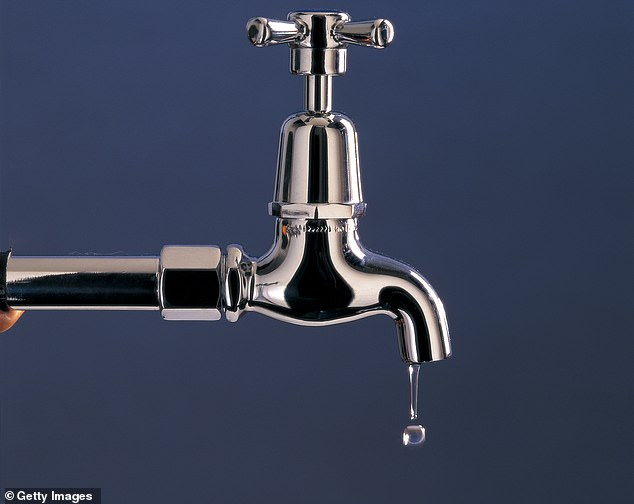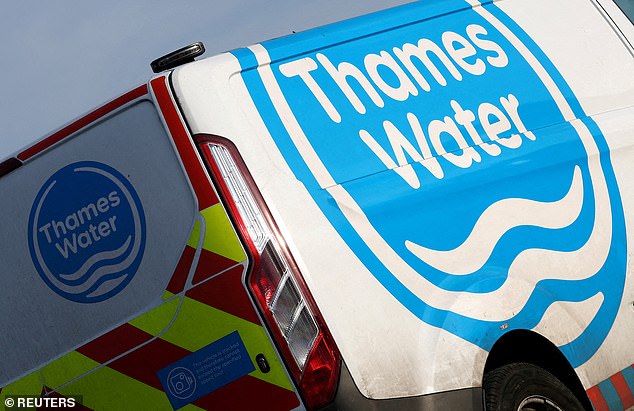For Thames Water’s 16 million customers, the past few weeks have been deeply unsettling.
Court battles, protests at the company’s HQ, and most troubling of all a big increase in their bills for the year ahead. Horrible, absolutely horrible.
Drowning in debt after decades of corporate largesse, the country’s largest water company won an important court judgement earlier this week, securing its immediate future as an ongoing concern.
Yet, while the Court of Appeal’s decision to throw out the blocking of £3billion of new finance means the utility company now has enough money to keep hobbling on until at least May next year, it’s a company that has few fans.
Indeed, it’s reviled, as evidenced yesterday when chief executive Chris Weston and his chief financial officer were subject to citizen’s arrest by protesters at the company’s headquarters in Reading, Berkshire.
Among the charges levelled at them were mismanaging customer funds, illegally discharging sewage and providing both unsafe infrastructure and drinking water.

Squeezed: The average Thames Water bill will rise from £488 to £639, compared to an industry average of £603 – but many readers say theirs are far higher
Many of the company’s customers would, at the very least, have admired the chutzpah of the protesters for they are also an unhappy group.
They are unimpressed with the way their bills are soaring as a result of the company’s dire financial situation – and its need to pay interest on expensive debt accumulated over years of boardroom greed and dividend windfalls for shareholders.
Some are facing frightening bill increases from the start of next month which bear little resemblance to the steep average
31 per cent price hike that the sector’s trade association Water UK has confirmed Thames Water will impose.
The average bill will rise from £488 to £639, compared to an industry average of £603 (a 26 per cent increase from £480).
Numerous Money Mail readers have told us their bills with the country’s largest water company will rise higher than 31 per cent.
A customer, for example, who lives in a four-bedroom house in Surbiton, Surrey, has been told their annual bill (covering both water supply and removal of wastewater) will increase 43 per cent – from £522 to £748.
Similarly, Peter Brown, from Swanley in Kent, says his bill is rising 39 per cent while Michael Atkinson, from Claygate in Surrey, says he and his wife face a 61 per cent increase. ‘Totally immoral,’ is his verdict.
It’s hard to disagree with Michael, although others such as Peter Scott, a 66-year-old train driver from Bow in East London, face larger percentage increases (100 per cent in Peter’s case).
Yet, apart from feeling victimised by being asked to pay more than the average 31 per cent, these customers also don’t see how the dramatic price rises they face fit with the five-year price ‘cap’ imposed on Thames Water by water regulator Ofwat. It’s as if they have already paid their dues – and more besides.
The cap means Thames Water can increase average bills (excluding inflation) over the next five years by no more than 35 per cent.
For the record, similar generous five-year price caps have been applied to rival companies as Ofwat seeks to get the sector to divert more of its revenue into improving its appalling environmental record (sewage spills galore) and investing in more water supply projects (reservoirs), rather than paying bosses outlandish bonuses.
Glynis Whitbread, 76, a former Post Office counter clerk from Swindon in Wiltshire, has been told her monthly Thames Water bill will go up 53 per cent next month.
Married to Keith, a retired postman, Glynis told Money Mail. ‘I’m already facing a price hike above the 35 per cent increase that Thames Water is meant to adhere to over the next five years.
Does that mean my bill will fall next year so the company keeps within the 35 per cent five-year cap, or will it keep rising as I suspect it will?
‘I tried to get answers by ringing Thames Water, but I got none. I feel customers like us are being squeezed by a company we are obliged to use. We’re trapped. It’s not as if we can shop around like we do for energy.
‘At the very least, the company should spell out why people like us are facing immediate increases that are higher than both the average 31 per cent for the year ahead and the permitted 35 per cent hike over five years.’
The enormous range in price increases is, in large part, a result of fixed charges for the provision of fresh water and/or wastewater rising faster than the ‘volumetric’ rate for water use.
For households whose water usage is low and metered (as with the Whitbreads and Mr Scott), the result is a big percentage increase in their bills.
It’s a point Thames Water customer Peter Ferret (not his real name) has proved. Taking into account next month’s increases in fixed and volumetric charges, Mr Ferret has calculated the increase in overall bills for customers using four levels of water usage.

‘Totally immoral’: Thames Water is drowning in debt after years of boardroom greed and dividend windfalls for shareholders
He discovered that in all cases, the increase for the year ahead is above both 31 per cent and Ofwat’s five-year 35 per cent cap – ranging from 37 to 48 per cent.
Those using the lowest amount of water, concluded Mr Ferret, face the highest percentage increases.
‘It doesn’t seem right that Thames Water is taking its permitted 35 per cent increase in the first year rather than spreading it over five years,’ he concludes.
Yesterday, the Consumer Council for Water (CCW), the ‘independent voice’ for water customers, said Thames Water cannot collect extra revenue that exceeds the average 35 per cent five-year price limit set by Ofwat.
The CCW’s Andy White said: ‘Average bills can appear misleading to customers and cause confusion and frustration when they receive their own bill.
‘It’s imperative, particularly when households are facing steep bill rises, that Thames Water and other companies explain the reasons behind them – or they risk fuelling people’s mistrust.’
Thames Water said it was ‘vital’ that it invested in its ‘network and infrastructure over the next five years’.
It said it already helped 450,000 customers pay their bills, adding: ‘We would encourage any customer who is concerned about their ability to pay to contact us so we can assess the right package of support for their circumstances.’
Caroline Abrahams, charity director at Age UK, said: ‘Many older people who are Thames Water customers will be concerned about these significant price rises.’
She added: ‘At a time when the cost of everything is continually going up, such enormous increases to people’s water bills put further strain on household finances, and lead to more people failing to make ends meet.
‘Access to water is a human right and not something people can do without. We need our government and regulators to ensure that customers are being treated fairly and that water companies are living up to their social responsibilities.’
What concerns me is that having front-loaded customers’ bills, Thames Water could go back to Ofwat and ask for the 35 per cent increase to be hiked (it is already challenging the regulator’s decision to trim the 53 per cent increase it wanted).
It’s a probability given the parlous state of the company’s finances. Ofwat must resist. Customers have already paid enough for Thames Water’s financial follies.
Jeff.prestridge@dailymail.co.uk
Some links in this article may be affiliate links. If you click on them we may earn a small commission. That helps us fund This Is Money, and keep it free to use. We do not write articles to promote products. We do not allow any commercial relationship to affect our editorial independence.







